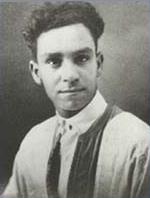The directory «Plots»
al-Shabbi Abu al-Qasim (أبو القاسم الشابي)
(1909—1934)

Born in the southern Tunisian oasis town of Tozeur, Abu al-Qasim al-Shabbi had a mobile childhood because of his father's judicial career. The constant traveling familiarized him with the Tunisian countryside and people and induced in him a profound and lifelong infatuation with both that permeated his later poetry. Studies at Tunis's eminent Zaytuna Mosque university and law school also influenced al-Shabbi, but they clashed with his penchant for European and Arabic literature and with his budding rebellion against the French colonial system and the restrictions of the Arab poetic tradition. His entire poetic career was compressed in a seven-year period that occurred between age eighteen, when he began publishing his poetry, and age twenty-five, when he succumbed to heart disease. The pressures of family obligations caused by his father's untimely death in 1929 and the additional responsibilities occasioned by his marriage are thought to have contributed to his early demise in October 1934.
New currents in Arab poetry from the Middle East and North America stirred al-Shabbi's imagination, as did the European Romantics. Al-Shabbi sought to break the bonds of convention and tradition and to revolutionize both poetry and society. Although he opposed the French colonial regime, he also castigated traditional Tunisian mores and called for social transformation, freedom, and progress. For this imaginative poet, the city contrasted unfavorably with nature, where he felt he could escape into a solitary utopia and indulge in his pursuit of idealized womanhood.
Al-Shabbi's revolutionary stance appealed to a later generation of Tunisian and Arab nationalists. Along with other Tunisians of his generation, alShabbi contributed to the literary renaissance of his country, at the same time that other Tunisians heralded a social renaissance (for example, Tahir al-Haddad in his epochal work on Tunisian women) and a political renaissance (for example, Habib Bourguiba through his founding of the NeoDestour party in the year of al-Shabbi's death). AlShabbi helped Tunisian poets break with traditional forms and find a more impassioned poetic expression that could help move the Tunisian people toward social awakening and a modern outlook. Many of his poems were set to music and became patriotic or popular songs. During October 1994, which marked the sixtieth-anniversary commemoration of the poet's death, celebrations were held in the towns al-Shabbi had visited or resided in, such as Tozeur (his birthplace and the site of his mausoleum), Majaz al-Bab, Gafsa, and Kebilli. Al-Shabbi is known as the "poet of life," after his most famous collection of poems, Songs of Life.
Tunisia, 1962, Abu al-Qasim al-Shabbi
Tunisia, 1984, Abu al-Qasim al-Shabbi
Tunisia, 1995, Abu al-Qasim al-Shabbi
Tunisia, 2009, Aboul Qasem Chebbi